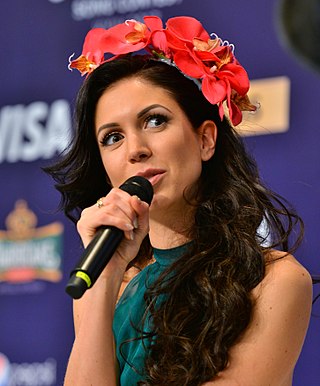
Estonia has participated in the Eurovision Song Contest 29 times since making its debut in 1994. Its first appearance would have taken place in 1993 but a qualification round was installed for seven former Eastern Bloc countries hoping to make their debut in the contest, with Estonia failing to qualify. Estonia has won the contest once, in 2001. The current Estonian participant broadcaster in the contest is Eesti Rahvusringhääling (ERR).

Laura Põldvere sometimes known professionally as simply Laura, is an Estonian singer. She is said to be the most played Estonian artist on Estonian radio in the past decade. She is internationally known for representing Estonia in the Eurovision Song Contest 2005 as part of the girl group Suntribe and did so again in 2017 in a duet with Koit Toome, singing "Verona."
Eesti Laul is an annual music competition organised by Estonian public broadcaster Eesti Rahvusringhääling (ERR). It determines the country's representative for the Eurovision Song Contest, and has been staged every year since 2009. Eesti Laul was introduced in 2009, replacing the former Eurolaul festival which had been used since Estonia's first Eurovision participation in 1993. It is one of the most popular television programmes in Estonia; it is also broadcast on radio and the Internet. In 2012, the semi-finals averaged 199,000 viewers, and over an estimated 296,000 viewers watched the final.
Estonia participated in the Eurovision Song Contest 2010 with the song "Siren" written by Robin Juhkental. The song was performed by Malcolm Lincoln and Manpower 4. The Estonian broadcaster Eesti Rahvusringhääling (ERR) organised the national final Eesti Laul 2010 in order to select the Estonian entry for the 2010 contest in Oslo, Norway. Ten songs competed in the national final and the winner was selected over two rounds of voting. In the first round, a jury panel and a public vote selected the top two to qualify to the super final.In the super final, "Siren" performed by Malcolm Lincoln and Manpower 4 was selected as the winner entirely by a public vote.

Robin Juhkental is an Estonian singer. He is the frontman of Malcolm Lincoln.
Estonia participated in the Eurovision Song Contest 2014 with the song "Amazing" written by Timo Vendt and Tanja. The song was performed by Tanja. The Estonian broadcaster Eesti Rahvusringhääling (ERR) organised the national final Eesti Laul 2014 in order to select the Estonian entry for the 2014 contest in Copenhagen, Denmark. The national final consisted of three shows: two semi-finals and a final. Ten songs competed in each semi-final and the top five from each semi-final as determined by a jury panel and public vote qualified to the final. In the final, the winner was selected over two rounds of voting. In the first round, a jury panel and a public vote selected the top two to qualify to the superfinal. In the superfinal, "Amazing" performed by Tanja was selected as the winner entirely by a public vote.

Raul-Stig Rästa is an Estonian singer and songwriter who, along with singer Elina Born, represented Estonia in the Eurovision Song Contest 2015 with the song "Goodbye to Yesterday".

Uku Suviste is an Estonian singer-songwriter, pianist and music producer. He was scheduled to represent Estonia in the Eurovision Song Contest 2020 in Rotterdam, Netherlands, before cancellation of the competition that year. Instead, he represented Estonia in the Eurovision Song Contest 2021.
Estonia participated in the Eurovision Song Contest 2016 with the song "Play" written by Fred Krieger, Stig Rästa and Vallo Kikas. The song was performed by Jüri Pootsmann. The Estonian broadcaster Eesti Rahvusringhääling (ERR) organised the national final Eesti Laul 2016 in order to select the Estonian entry for the 2016 contest in Stockholm, Sweden. The national final consisted of three shows: two semi-finals and a final. Ten songs competed in each semi-final and the top five from each semi-final as determined by a jury panel and public vote qualified to the final. In the final, the winner was selected over two rounds of voting. In the first round, a jury panel and a public vote selected the top three to qualify to the superfinal. In the superfinal, "Play" performed by Jüri Pootsmann was selected as the winner entirely by a public vote.
Estonia participated in the Eurovision Song Contest 2017 with the song "Verona" written by Sven Lõhmus. The song was performed by Koit Toome, who had previously represented Estonia in the Eurovision Song Contest in 1998 where he placed twelfth with the song "Mere lapsed", and Laura, who had previously represented Estonia in the Eurovision Song Contest in 2005 as part of the group Suntribe where she failed to qualify to the final with the song "Let's Get Loud". The Estonian broadcaster Eesti Rahvusringhääling (ERR) organised the national final Eesti Laul 2017 in order to select the Estonian entry for the 2017 contest in Kyiv, Ukraine. The national final consisted of three shows: two semi-finals and a final. Ten songs competed in each semi-final and five from each semi-final as determined by a jury panel and public vote qualified to the final. In the final, the winner was selected over two rounds of voting. In the first round, a jury panel and a public vote selected the top three to qualify to the super final. In the super final, "Verona" performed by Koit Toome and Laura was selected as the winner entirely by a public vote.
Estonia participated in the Eurovision Song Contest 2018 with the song "La forza" written by Mihkel Mattisen, Timo Vendt, Ksenia Kuchukova and Elina Nechayeva. The song was performed by Elina Nechayeva. The Estonian broadcaster Eesti Rahvusringhääling (ERR) organised the national final Eesti Laul 2018 in order to select the Estonian entry for the 2018 contest in Lisbon, Portugal. The national final consisted of three shows: two semi-finals and a final. Ten songs competed in each semi-final and five from each semi-final as determined by a jury panel and public vote qualified to the final. In the final, the winner was selected over two rounds of voting. In the first round, a jury panel and a public vote selected the top three to qualify to the superfinal. In the superfinal, "La forza" performed by Elina Nechayeva was selected as the winner entirely by a public vote.
Estonia participated in the Eurovision Song Contest 2019 with the song "Storm" written by Stig Rästa, Vallo Kikas, Victor Crone and Fred Krieger. The song was performed by Victor Crone. The Estonian broadcaster Eesti Rahvusringhääling (ERR) organised the national final Eesti Laul2019 in order to select the Estonian entry for the 2019 contest in Tel Aviv, Israel. The national final consisted of three shows: two semi-finals and a final. Twelve songs competed in each semi-final and six from each semi-final as determined by a jury panel and public vote qualified to the final. In the final, the winner was selected over two rounds of voting. In the first round, a jury panel and a public vote selected the top three to qualify to the superfinal. In the superfinal, "Storm" performed by Victor Crone was selected as the winner entirely by a public vote.
Estonia originally planned to participate in the Eurovision Song Contest 2020 with the song "What Love Is" written by Uku Suviste and Sharon Vaughn. The song was performed by Uku Suviste. The Estonian broadcaster Eesti Rahvusringhääling (ERR) organised the national final Eesti Laul 2020 in order to select the Estonian entry for the 2020 contest in Rotterdam, Netherlands. The national final consisted of three shows: two semi-finals and a final. Twelve songs competed in each semi-final and six from each semi-final as determined by a jury panel and public vote qualified to the final. In the final, the winner was selected over two rounds of voting. In the first round, a jury panel and a public vote selected the top three to qualify to the superfinal. In the superfinal, "What Love Is" performed by Uku Suviste was selected as the winner entirely by a public vote.
Estonia participated in the Eurovision Song Contest 2021 with the song "The Lucky One" written by Uku Suviste and Sharon Vaughn. The song was performed by Uku Suviste. The Estonian broadcaster Eesti Rahvusringhääling (ERR) organised the national final Eesti Laul 2021 in order to select the Estonian entry for the 2021 contest in Rotterdam, Netherlands. The national final consisted of three shows: two semi-finals and a final. Twelve songs competed in each semi-final and six from each semi-final as determined by a jury panel and public vote qualified to the final. In the final, the winner was selected over two rounds of voting. In the first round, a jury panel and a public vote selected the top three to qualify to the superfinal. In the superfinal, "The Lucky One" performed by Uku Suviste was selected as the winner entirely by a public vote.
Estonia participated in the Eurovision Song Contest 2022 in Turin, Italy, with "Hope" performed by Stefan. The Estonian broadcaster Eesti Rahvusringhääling (ERR) organised the national final Eesti Laul2022 in order to select the Estonian entry for the contest. The national final consisted of seven shows: four quarter-finals, two semi-finals and a final. Ten songs competed in each quarter-final and semi-final and five from each show as determined by a jury panel and public vote qualified to the final. In the final, the winner was selected over two rounds of voting. In the first round, a jury panel and a public vote selected the top three to qualify to the superfinal. In the superfinal, "Hope" performed by Stefan was selected as the winner entirely by a public vote.

"Hope" is a song by Estonian-Armenian singer Stefan Airapetjan. The song represented Estonia in the Eurovision Song Contest 2022 in Turin, Italy after winning Eesti Laul 2022, Estonia's national final.

Karl-Erik Taukar is an Estonian singer, bass guitarist and television host.
Uudo Sepp is an Estonian singer.
Estonia participated in the Eurovision Song Contest 2023 in Liverpool, United Kingdom, with "Bridges" performed by Alika. The Estonian broadcaster Eesti Rahvusringhääling (ERR) organised the national final Eesti Laul 2023 in order to select the Estonian entry for the 2023 contest. The national final consisted of three shows: two semi-finals and a final. Ten songs competed in each semi-final and six from each semi-final as determined by a jury panel and public vote qualified to the final alongside two wildcards selected by the public. In the final, the winner was selected over two rounds of voting. In the first round, a jury panel and a public vote selected the top three to qualify to the superfinal. In the superfinal, "Bridges" performed by Alika was selected as the winner entirely by a public vote.
Estonia participated in the Eurovision Song Contest 2024 in Malmö, Sweden, with "(Nendest) narkootikumidest ei tea me (küll) midagi" performed by 5miinust and Puuluup. The Estonian broadcaster Eesti Rahvusringhääling (ERR) organised the national final Eesti Laul2024 in order to select the Estonian entry for the contest. The national final consisted of two shows: a semi-final and a final. Fifteen songs competed in the semi-final and five were automatically qualified for the final. A total of five songs qualified from the semi-final: three were determined by a jury panel and public vote and two were selected solely by the public vote. In the final, the winner was selected over two rounds of voting. In the first round, a jury panel and a public vote selected the top three to qualify to the superfinal. In the superfinal, "(Nendest) narkootikumidest ei tea me (küll) midagi" performed by 5miinust and Puuluup was selected as the winner entirely by a public vote.








